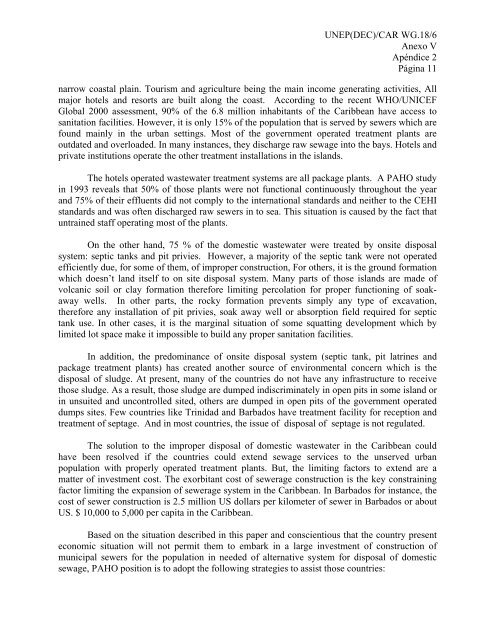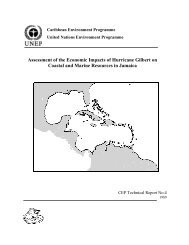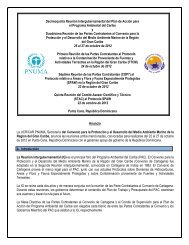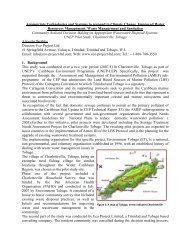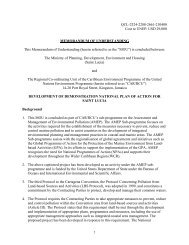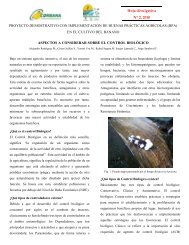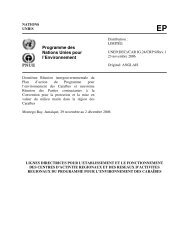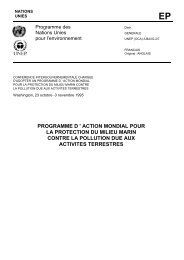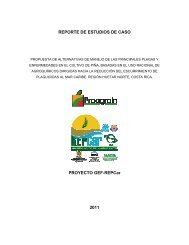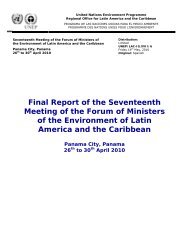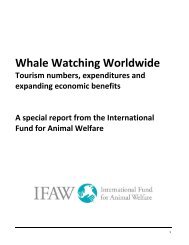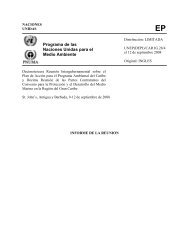Caribbean Environment Programme - UNEP
Caribbean Environment Programme - UNEP
Caribbean Environment Programme - UNEP
Create successful ePaper yourself
Turn your PDF publications into a flip-book with our unique Google optimized e-Paper software.
<strong>UNEP</strong>(DEC)/CAR WG.18/6<br />
Anexo V<br />
Apéndice 2<br />
Página 11<br />
narrow coastal plain. Tourism and agriculture being the main income generating activities, All<br />
major hotels and resorts are built along the coast. According to the recent WHO/UNICEF<br />
Global 2000 assessment, 90% of the 6.8 million inhabitants of the <strong>Caribbean</strong> have access to<br />
sanitation facilities. However, it is only 15% of the population that is served by sewers which are<br />
found mainly in the urban settings. Most of the government operated treatment plants are<br />
outdated and overloaded. In many instances, they discharge raw sewage into the bays. Hotels and<br />
private institutions operate the other treatment installations in the islands.<br />
The hotels operated wastewater treatment systems are all package plants. A PAHO study<br />
in 1993 reveals that 50% of those plants were not functional continuously throughout the year<br />
and 75% of their effluents did not comply to the international standards and neither to the CEHI<br />
standards and was often discharged raw sewers in to sea. This situation is caused by the fact that<br />
untrained staff operating most of the plants.<br />
On the other hand, 75 % of the domestic wastewater were treated by onsite disposal<br />
system: septic tanks and pit privies. However, a majority of the septic tank were not operated<br />
efficiently due, for some of them, of improper construction, For others, it is the ground formation<br />
which doesn’t land itself to on site disposal system. Many parts of those islands are made of<br />
volcanic soil or clay formation therefore limiting percolation for proper functioning of soakaway<br />
wells. In other parts, the rocky formation prevents simply any type of excavation,<br />
therefore any installation of pit privies, soak away well or absorption field required for septic<br />
tank use. In other cases, it is the marginal situation of some squatting development which by<br />
limited lot space make it impossible to build any proper sanitation facilities.<br />
In addition, the predominance of onsite disposal system (septic tank, pit latrines and<br />
package treatment plants) has created another source of environmental concern which is the<br />
disposal of sludge. At present, many of the countries do not have any infrastructure to receive<br />
those sludge. As a result, those sludge are dumped indiscriminately in open pits in some island or<br />
in unsuited and uncontrolled sited, others are dumped in open pits of the government operated<br />
dumps sites. Few countries like Trinidad and Barbados have treatment facility for reception and<br />
treatment of septage. And in most countries, the issue of disposal of septage is not regulated.<br />
The solution to the improper disposal of domestic wastewater in the <strong>Caribbean</strong> could<br />
have been resolved if the countries could extend sewage services to the unserved urban<br />
population with properly operated treatment plants. But, the limiting factors to extend are a<br />
matter of investment cost. The exorbitant cost of sewerage construction is the key constraining<br />
factor limiting the expansion of sewerage system in the <strong>Caribbean</strong>. In Barbados for instance, the<br />
cost of sewer construction is 2.5 million US dollars per kilometer of sewer in Barbados or about<br />
US. $ 10,000 to 5,000 per capita in the <strong>Caribbean</strong>.<br />
Based on the situation described in this paper and conscientious that the country present<br />
economic situation will not permit them to embark in a large investment of construction of<br />
municipal sewers for the population in needed of alternative system for disposal of domestic<br />
sewage, PAHO position is to adopt the following strategies to assist those countries:


